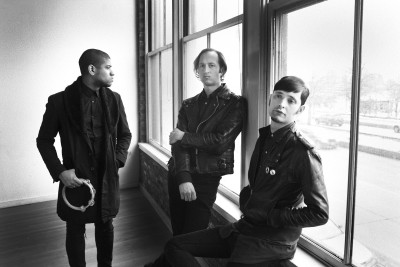
In a world as inundated with hip-hop and rap as it is with racial injustice, Algiers has come barreling onto the scene as a direct alternative to their peers. Hailed by Rolling Stone as “the Death Grips of gospel,” Algiers frontman Franklin James Fisher, guitarist Lee Tesche and bassist Ryan Mahan are three Georgia boys and longtime friends who started making music together in graduate school.
The trio specializes in a style that one-ups the nasty lo-fi of Jack White and Alabama Shakes while delving into tragic topics that no popular soul or blues groups have dared to explore in recent years. Songs such as “Blood,” “Black Eunuch” and “Irony. Utility. Pretext” dive head first into poverty, futility and the history of racial violence with a resigned cynicism that could only belong to an American band.
When asked about the band’s messages, Tesche made it clear that the music always comes first.
“We’re really focused on making the best end product that we can,” he said. “The lyrics are a part of that, but we’ve never started writing a song with the desire to push a specific message.”
If the intent was always on music as a whole, Algiers has succeeded with astonishing force. No band since the Clash has so deftly matched socioeconomic outrage with danceable, catchy musicality.
Not to say that Algiers is very melodic — the Death Grips comparison is apt, and their songs owe as much to noise rock and Nick Cave as they do to their gospel roots. Still, this mix of seemingly disparate styles never feels as if those styles are clashing. The entirety of the band’s eponymous debut shines with well-considered coherence and meticulous production.
Tesche believes that their transatlantic recording process — living in London, he and Mahan would swap recording files with Fisher in New York — may have had something to do with that.
“It was difficult, but not being in the studio together really elevated some of our work,” he said. “I always wanted to make sure we had the best possible version of what we were making before I would send it back to Frank.”
All three members are proficient drum programmers and sampling aficionados, which comes through in every note of the album’s belabored chain gang beats and frenetic nervous breakdown bass lines. The band’s skill for rhythm keeps their sound direct and tight, even when their noise-rock leanings threaten to take over.
“I still don’t consider myself a singer,” Fisher once told Rolling Stone. “I just kind of scream and do my thing.”
One wouldn’t know it for how well his booming, furious vocals fit into the perfect puzzle that is Algiers. If he were what he considers to be a “singer,” the band probably wouldn’t be much good at all.
It is impossible not to frame Algiers in the context of police brutality and unresolved racial issues that have reared their heads in the last year or so. However, Tesche insists that Algiers’ debut this year is mostly a coincidence.
“We started writing before most of the Black Lives Matter stuff went down,” he said, “so it’s very much from us rather than our surroundings.”
Even so, a tone of outrage and exhaustion pervades the album. When pressed on the issue, Tesche gave a curt response.
“Franklin is the ideological one,” he said. “Most of the lyrics come from him.”
The message seems to be that Algiers didn’t aim to be the revolution their unapologetic sound suggests, but regardless, Tesche admitted that some audiences don’t quite understand the band.
“It’s a strange kind of music to perform in front of people,” he said. “Some people get it, but other times, the audience just isn’t engaging at all. Those are the times when the confrontational element comes out. It’s much more fun when the audience is engaged, but the anger comes out in those ‘us versus them’ situations.”
Algiers will be performing at Brighton Music Hall on Thursday.














